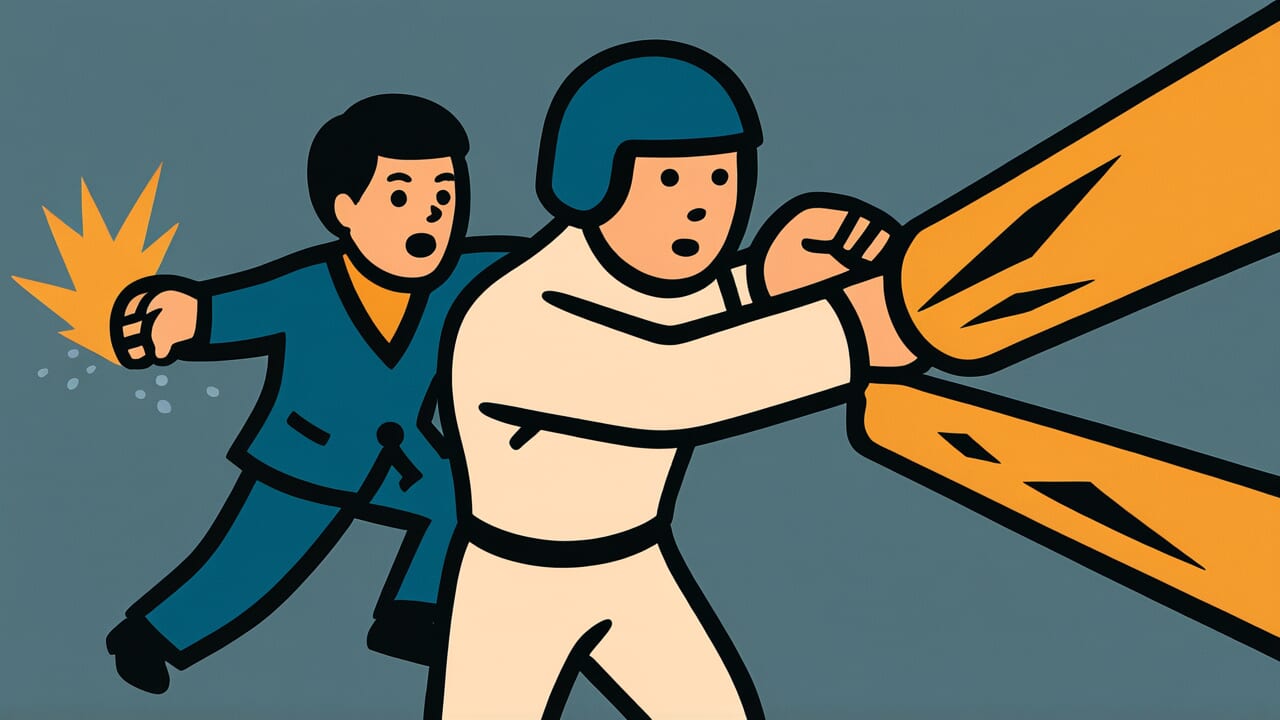How to Read “The best defense is a good offense”
Kōgeki wa saidai no bōgyo
Meaning of “The best defense is a good offense”
This proverb means that attacking actively is the most effective way to defend yourself, rather than staying in a purely defensive position.
When you wait for your opponent’s move and only react passively, you always fall behind. Things progress at your opponent’s pace.
Instead, by taking the initiative and acting first, you seize control. You force your opponent to respond to you.
As a result, you prevent yourself from falling into a disadvantageous situation. This is the core idea behind the saying.
People use this proverb in sports when aggressive play puts more pressure on opponents than pure defense. In business, it applies when companies launch new proposals instead of waiting for competitors to move.
Passive defense gives opponents chances to attack. But an aggressive offensive stance forces opponents into defense, which naturally protects you.
Origin and Etymology
“The best defense is a good offense” is not actually an ancient Japanese proverb. It came to Japan from Western military thinking in relatively recent times.
The English expression “The best defense is a good offense” is likely the original source.
This concept itself has been recognized worldwide as a basic military strategy since ancient times. Rather than waiting passively for enemy attacks, striking first weakens the opponent’s offensive power.
This tactical theory shows how taking initiative minimizes your own damage.
In Japan, this concept was probably introduced after the Meiji period, when Western military theories were actively studied. Later, it spread widely in the sports world.
It became especially common in soccer and baseball, used to express how attacking is more advantageous than pure defense.
Today, people use it beyond military and sports contexts. It applies to business and daily life as a mindset.
The saying has deeply penetrated Japanese society as a reminder that taking active initiative matters more than staying passive.
Usage Examples
- In a new product planning meeting, I proposed launching before competitors, saying the best defense is a good offense
- When we were losing the game, the coach said the best defense is a good offense and pushed everyone to the front line
Universal Wisdom
“The best defense is a good offense” reveals the essence of survival strategy that humans instinctively understand. Why did humanity discover this truth?
Because throughout long history, we learned about the anxiety of waiting and the power of action.
When we stay passive, we face constant anxiety. We don’t know what will happen next or how opponents will move.
This uncertainty itself weakens us most. But when we take action ourselves, we seize control.
Uncertainty decreases, and we feel we can control the situation through our own will.
This wisdom has been passed down through generations because it’s not just tactical theory. It’s a truth about life itself.
When facing difficulties, merely enduring breaks our spirit. But by confronting those difficulties and taking initiative, we find hope.
Our ancestors realized something important. Humans become stronger by living actively rather than passively.
The moment we become defensive, we shrink and narrow our possibilities. But when we take an offensive stance, we unleash our full potential.
When AI Hears This
The attacker’s greatest weapon is the power to make opponents consume choices. In shogi, when the first player moves a bishop, the second player must decide: exchange bishops, retreat, or ignore?
At this moment, the defender’s thinking resources get absorbed in responding to the attack. They have less capacity to plan their own strategy.
Game theory calls this “reaction cost.” Defenders always move after seeing the opponent’s hand, so their information processing burden increases with each move.
More importantly, only the attacker knows where they will strike. In soccer, attackers can choose to pass left or right.
But defenders must prepare for both directions. When attackers can concentrate 10 units of power on one point, defenders must spread the same 10 units across multiple locations.
Probabilistically, attackers can choose options with 100 percent success probability. But defenders’ prediction accuracy drops to one divided by the number of choices.
Cybersecurity shows the same structure. Attackers only need to find one vulnerability among thousands to break in.
But defenders must patch every hole. This asymmetry is why attack has structural advantages.
The side that moves first controls how information flows and can impose the cost of uncertainty on opponents.
Lessons for Today
This proverb teaches you about the importance of taking initiative in life. In modern society, change happens fast.
If you just wait, you miss opportunities. In job hunting, romance, or career building, being passive won’t bring the results you want.
The key is understanding “offense” not as “hurting others” but as “taking initiative yourself.” Learning new skills, building relationships proactively, proposing ideas—all these active behaviors are forms of “offense.”
Many people can’t move because they fear failure. But doing nothing is the biggest risk.
If you act, you might fail, but you learn from it. If you do nothing, time just passes and opportunities disappear.
In your life, moments will come when you want to play defense. When that happens, remember these words.
The courage to take one step forward becomes the strongest shield protecting you.



Comments